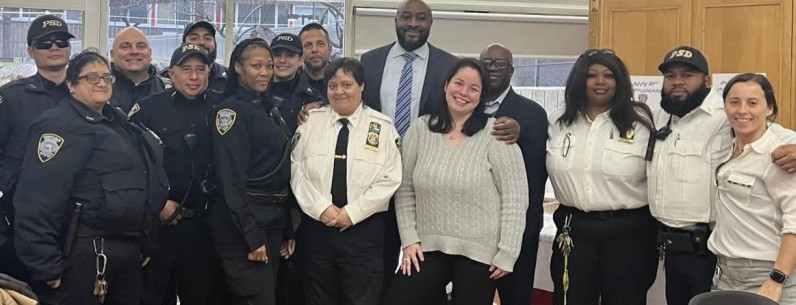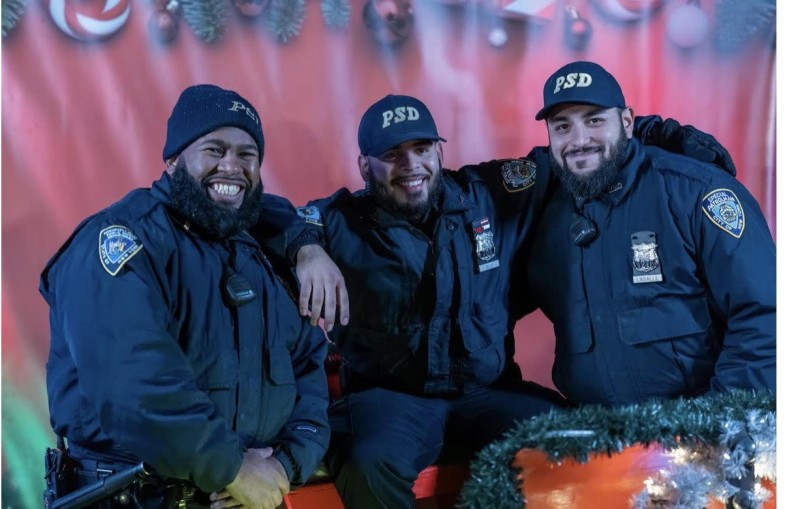
On a warm summer day on Roosevelt Island in New York City, officers from the Public Safety Department (PSD) can be seen at a community event, giving popcorn and other treats to residents whose cheery faces they recognize. These peace officers interact with citizens daily, which has proven to be a critical function.
"Our PSD officers come to all the community events," says Shelton J. Haynes, the Chief Executive Officer (CEO) of Roosevelt Island Operating Corporation (RIOC), the de facto government for the island's 12,000 residents. "They're not just sitting [at their] posts; they engage with - and show interest in the community."
Like a pearl in an oyster, Roosevelt Island is a hidden treasure situated in the East River between Manhattan and Queens. The small population, confined to 2 miles of earth, infuses the area with a neighborly vibe.
"We are running a small town in the middle of New York City," Haynes says.
That friendly personality can be partially credited to the presence of the Public Safety Department, which includes 50 peace officers. Ten officers are in leadership roles, and the rest patrol the island.
"Our public safety officers know almost all of our residents," Haynes states. "They're speaking with them. They're out in the elements. They ride the buses. They're by all of our transportation hubs. They are engaged with store owners and residents. That deters crime."
Like many city governments in the United States, RIOC embraces the philosophy of community policing as a softer alternative to traditional policing. This light-touch approach is evident through the behavior of the Public Safety Department officers. They serve as our first responders to emergencies that occur on the Island, but they also closely liaise with NYPD, in particular the 114th Precinct, among other law enforcement agencies.
Recent tragedies between police and the public have underscored a deep-rooted discord. And unfortunately, these tragedies have occurred and continue to occur all over the country. Understanding this, PSD officers eschew heavy-handed treatment in favor of building trust within the community. It's an approach that emphasizes community partnership and problem-solving techniques in an effort to build trusting relationships between the peace force and the community it serves. Community policing fosters non-accusatory interactions that put the public at ease.
"Roosevelt Island is one of the safest places in New York City, which is attributed to our Public Safety Department," Haynes adds.
The Public Safety Department is led by two well-established former esteemed members of the New York City Police Department, and peace officers who serve with PSD must complete a rigorous training program offered by NYPD Academy instructors. This program is similar to that of NYPD officers. The experience teaches officers skills, including how to de-escalate situations, respond to an active shooter, and determine whether someone experiencing a mental health crisis needs to go to a hospital. Those who complete the program are then sworn in as peace officers and have full arrest powers with the ability to conduct traffic stops.
The Public Safety Department is closely aligned with the NYPD, as those officers also work on Roosevelt Island. Their presence foments the community-focused approach since community policing relies on collaborative partnerships between law enforcement agencies and public safety officers. Together, they develop solutions to problems and increase trust in law enforcement.
"Our officers put on their uniform in honor of the people they are sworn to serve and protect - they take great pride in the badge they wear and will continue to hold themselves to that standard each and every day, said Public Safety Department Chief Kevin Brown.
A former Roosevelt Island Public Safety Officer and now New York City Police Department Internal Affairs Sergeant Jason Guzman stated, "As a former Roosevelt Island Public Safety Officer under the leadership of then Captain Suarez, I can confidently say that my experience with the agency prepared me for a successful career with the New York City Police Department."
"We're in constant communication with the NYPD," Haynes states. "That has gone a long way with knowing who the players are, building discussions holistically, and tackling the challenging issues."
"When someone calls 911, as our first responders, they go to the scene," Haynes says. "They de-escalate issues, which is not always easy. They are trained to handle people in crisis."
The NYPD suggests that people first contact the Public Safety Department for issues that are not high-level crimes. These officers can resolve lower-tier crimes faster than a massive police department can.
"You have real-time responsiveness here and direct access because it's a small island," Haynes explains. "From the leadership on down, they're accessible.
How To Make Safety a Community Collaboration, According to RIOC's CEO Shelton Haynes

Roosevelt Island residents experience their fair share of jubilation. The Cherry Blossom Festival and Fourth of July celebration draw thousands of participants annually. Other community events include the annual National Night Out, a community-building campaign that promotes police-community partnerships and neighborhood camaraderie.
But life on the island isn't all cherry blossoms and fireworks. There's the beat work for PSD officers, including a daily exercise in which they walk through the island's various residential buildings. The officers cover three shifts in this 24-hour operation.
"The officers are present in every area of the island," RIOC's CEO Shelton Haynes states. "They walk the halls, get to know the neighbors, and engage in meaningful dialogue. That builds a lot of trust." That includes maintaining open lines of communication with Roosevelt Island's commercial tenants, guests at the senior center, and different organizations, including the Roosevelt Island Disabled Association and gardening clubs.
"It's meaningful when you see PSD's presence on the island. You feel safer because you know them," Haynes explains.
Haynes compliments one officer who works in the youth center and who does not play a traditional role.
"That person is engaging," Haynes says. "They interact with the children, who know that person is not just a peace officer, but also someone they can trust. That makes children feel safe, knowing that the peace officer is also a member of their community."
RIOC Hosts Monthly Community Meetings To Ensure All Voices Get Heard
Post-pandemic, the Public Safety Department is returning to a model that gets officers involved with community activities. PSD officers will be actively participating in activities such as soccer, flag-football, or baseball. By encouraging community engagement, the peace officers seem approachable. RIOC's CEO, Shelton Haynes, says such camaraderie goes back to one factor.
"I can honestly say - and this sounds a little cliche, but it's the actual truth - it's communication," he states. "Communication is a staple."
To communicate more clearly, members of the Roosevelt Island Public Safety Department will expand our monthly community-centric meetings. These Community engagement meetings will be fostered with members of RIOC, the New York Police Department the Roosevelt Island Residents Association, the Public Safety Committee, store owners, commercial tenants, and everyday citizens. The goal, simply put, is to collaborate to examine community concerns and find resolutions.
"The ongoing monthly meetings are so meaningful," Haynes explains. "A store owner may have an issue, as will the residents. Why not bring them together and figure out the challenge together? Why not have productive discussions with the stakeholders in the room to discuss challenges and workable solutions? Having everyone on the same page is essential."
Haynes believes situations unravel when the lines of communication get clogged. A lack of communication can become a time waster: If residents can get all the players together in a room, an issue might be nipped in the bud. The group can thwart a challenge when the facts are laid on the table and dissected up front.
"We want to make sure we bring things to the forefront and make everyone part of the conversation and the solution," Haynes says.
Local elected officials get invited too. RIOC is a public benefit corporation under New York State and under the governor's purview. PSD works closely with local elected officials, council members, assembly members, and senators alike who cover Roosevelt Island as part of their respective districts.
"Our community engagement sessions have been a pivotal component because it promotes accountability of how we are doing, as well as awareness of developing issues that may be occurring on the island," Haynes states.
A Model Public Safety Department Arises When Officers and Residents Communicate
A Princeton University study found positive contact with police significantly improved residents' attitudes toward public safety officers. Such interactions included door-to-door nonenforcement community policing visits.
"Going forward, I want us to be the model," avers RIOC's CEO Shelton Haynes.
Haynes says the officers' "extreme commitment" has earned the trust of the NYPD. In the future, RIOC will invest more resources in officer training. Haynes also wants to propagate the narrative about the vital work PSD does and talk about its successes in a meaningful way.
"We're going to have a lot more dialogue with the community," Haynes promises.
As Haynes repeatedly says, ensuring community security begins with peace officers who regularly converse with residents - because when public safety officers are a part of the community, it changes everything.







Join the Conversation